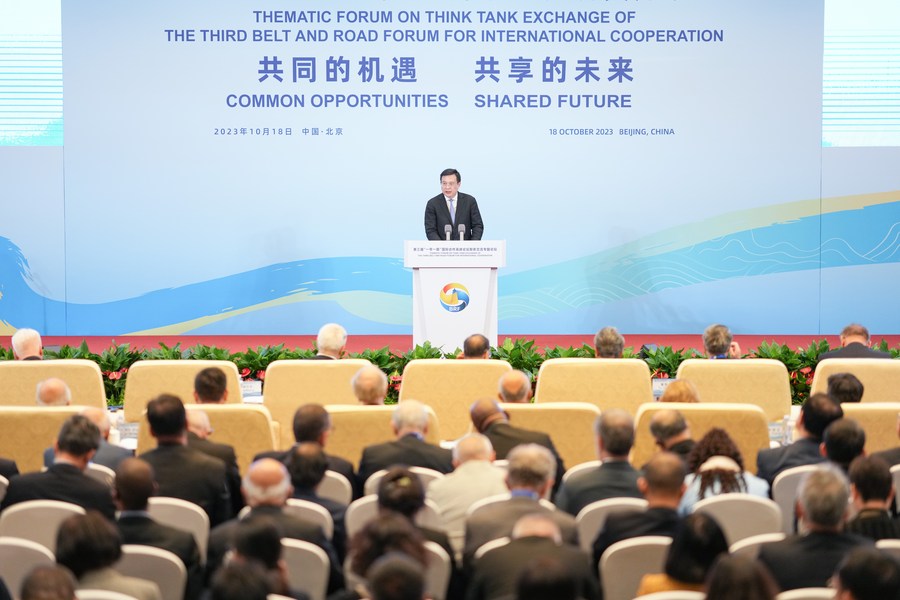BRI helps China become key global arena for idea exchange

Fu Hua, president of Xinhua News Agency, speaks at the Thematic Forum on Think Tank Exchange of the third Belt and Road Forum for International Cooperation (BRF), in Beijing, capital of China, Oct. 18, 2023. (Xinhua/Peng Ziyang)
BEIJING, Oct. 22 (Xinhua) -- About 200 people from 40 countries and regions and international organizations engaged in in-depth discussions during a recent thematic forum on think tank exchanges held in Beijing.
The event was part of the third Belt and Road Forum for International Cooperation that attracted representatives from over 150 countries and 40-plus international organizations.
This grand gathering, where views were shared and exchanged at an array of activities including the one on think tank exchanges, showed China's rising stature as a key global market for ideas.
A POPULAR FOCUS OF ACADEMIC RESEARCH
Drawing inspiration from the history of the ancient Silk Road, the Belt and Road Initiative (BRI) is among the worldwide buzzwords originating from China. Since it was first proposed in 2013, the BRI has been included in documents of the United Nations, the G20, APEC, and the Shanghai Cooperation Organization.
Over the past ten years, Belt and Road cooperation has expanded from the Eurasian continent to Africa and Latin America. More than 150 countries and over 30 international organizations have joined the BRI and signed more than 230 cooperation documents.
While Belt and Road cooperation is promoted, the BRI has also become a popular focus of international academic research. A series of academic achievements have been released in this regard over the past decade.
A research report unveiled at the thematic forum on think tank exchanges argues that the BRI has given rise to a genre of more inclusive and effective development science -- Belt and Road Development Studies.
As an open mechanism of academic exchanges and cooperation, the Belt and Road Studies Network (BRSN) was inaugurated in 2019. With 16 initiators, it was established to serve international think tanks, global and regional organizations, and researchers from various countries, and to promote studies and academic exchanges on the Belt and Road Initiative.
During a recent plenary meeting of the BRSN in Beijing, attendees said that think tanks should continue pooling wisdom to facilitate win-win Belt and Road cooperation.
GLOBAL INITIATIVES, WORLD-CLASS CONVENTIONS
Over the years, the common quest for infrastructure development across the Global South did not make the BRI partnership a monopolistic privilege of the developing world, said Ong Tee Keat, chairman of the Center for New Inclusive Asia, Malaysia, at the thematic forum on think tank exchanges.
Neither has the BRI taken a back seat with successive rollouts of the China-proposed global initiatives -- the Global Development Initiative (GDI), the Global Security Initiative (GSI), and the Global Civilization Initiative (GCI), Keat said.
He added that these three global initiatives serve as useful enabling platforms for the BRI in various fields.
In the view of Jose R. Cabanas Rodriguez, director of the Center for International Policy Research, Cuba, the BRI is an alternative answer to building a just, inclusive, and sustainable world.
Together with the other three global initiatives China is promoting today, it contributes to realizing the dream of building a global community of shared future, Rodriguez said.
"The exchange terms and its own dynamics, so different from those proposals that have led international society to the current unstable and fragile situation, are its best arguments," Rodriguez said.
"It is not fortuitous that it has been so warmly and widely received. It is up to us, the academics, to study and formulate proposals to promote people-to-people exchange and international cooperation within the framework of this valuable initiative," Rodriguez added.
In addition to initiatives, more and more world-class conventions are taking place in China, including the ongoing 81st World Science Fiction Convention (WorldCon) in Chengdu. The capital city of southwest China's Sichuan Province is the second city in Asia and the first in China to host this convention, which is one of the largest sci-fi events in the world.
Famous sci-fi writers from around the world are attending the five-day event which runs until Sunday, sharing their knowledge of new technology and their visions of a new world.
A LEADING CENTER OF INNOVATION, CREATIVITY
In his congratulatory letter to the thematic forum on think tank exchanges, the World Intellectual Property Organization (WIPO) Director General Daren Tang said that China has transformed into one of the world's leading centers of innovation, creativity, and technology.
According to the 2023 edition of the Global Innovation Index (GII) released by the WIPO, China now has 24 sci-tech clusters, up from 21 last year and making China the country with the greatest number of such clusters in the world.
Since joining the GII in 2013 at an initial ranking of 35th, the country has steadily climbed the rankings. In 2020, 2021, and 2022, China ranked 14th, 12th, and 11th, respectively, demonstrating its continuous upward trajectory in global innovation.
These remarkable achievements are helping to support China's objectives under the BRI, according to Tang.
"We all need China to build on the enormous successes of the BRI to help us all achieve broader international collaboration," said Ismail Serageldin, former vice-president of the World Bank.

